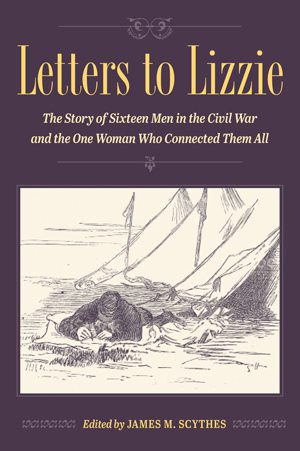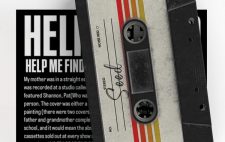 In an era when FaceTime didn’t exist and teenagers put quill to parchment instead of sending a text, a young South Jersey girl acted like an early version of social media for her friends who had gone to fight in the Civil War. Almost 2 centuries later, when Mullica Hill’s James Scythes found her letters, he knew it was a story that had to be told. His book, “Letters to Lizzie,” pieces together the stories of the soldiers who wrote back to Lizzie.
In an era when FaceTime didn’t exist and teenagers put quill to parchment instead of sending a text, a young South Jersey girl acted like an early version of social media for her friends who had gone to fight in the Civil War. Almost 2 centuries later, when Mullica Hill’s James Scythes found her letters, he knew it was a story that had to be told. His book, “Letters to Lizzie,” pieces together the stories of the soldiers who wrote back to Lizzie.
Q: Who is Lizzie?
Lizzie Brick was a 16-year-old girl living in Hurffville during the Civil War. Many of her friends went off to fight in the war, and Lizzie wrote to them all. She kept them informed of what was happening back home in Hurffville, but also told them about what was happening to their friends who were stationed in different regiments. She acted as a sort of social networking hub through the war.
Q: How many letters are there?
There are 124 letters in the book – 3 of which were written by Lizzie. Since the men she was writing were fighting in different regiments and constantly moving around, we don’t have most of the letters Lizzie wrote to them.
Q: Who was she writing to?
Lizzie wrote to her uncle, 2 of her cousins and friends from church and bible study.
Q: What did they talk about?
During the war, Lizzie seemed to act as a moral compass for many of the men. Many times, the men would write her saying they had “been a bad boy.” It was almost like she was their therapist – they would ask her for forgiveness. This is when I wish we had her letters, I want to know what she said in response to them. Especially with her cousin, Edward.
Q: What happened between her and Edward?
They had a big falling out. Edward and Lizzie were only a few months apart in age, and they grew up next door to each other, so they were like brother and sister. Towards 1963, Edward was injured. While at a hospital in Newark, he is hanging out with women who Lizzie doesn’t approve of. That would happen a lot when the men were at hospitals. They would say they were, “doing things I shouldn’t.” You can imagine the types of places they were going. But Edward also told Lizzie he was not a Christian anymore. There was an entire month with no correspondence, and then it picks back up again. So they made up somehow.
Q: Did Lizzie have a romantic relationship with any of them?
No, and all the men were very respectful writing to her – they never crossed a line. Except for Jacob Park, who made it clear in his first letters that he had feelings for her. He writes that he has dreams about her, wakes up and she’s not there and he cries. She sends him a photo, and he carries it in his breast pocket, near his heart. He also writes about his last day before going to war, when they kissed behind the granary. But when he comes back from the war, he marries someone else.
Q: Was it unusual for one woman to write to so many men?
There were women writing to men who didn’t have a romantic relationship with them, but those letters were sporadic throughout the war or would only last through the beginning of the war. It was unheard of for someone to write to this many people consistently through the entire war.
Q: What was a woman’s role in the Civil War?
I can imagine there were a lot of young women who wanted to go fight, and there are stories of some women disguising themselves. Lizzie wanted to march off to war, she even wrote: If the government needs more men, I would march. She reminds me of Jo from “Little Women.” Lizzie’s contribution to the war, though, was writing to her friends and family and keeping up morale.
Q: What was it like reading all those letters?
Sometimes, the process wasn’t just transcribing the letters, but basically translating them. Remember, most people had a basic education, so some letters had bad grammar. Not everyone’s writing was clear. Letters from Isaac Clark, who was the first of Lizzie’s friends to go off to war, have no consistency. He didn’t know how to write, so each letter was written by someone different.
I used photocopies of the letters, but sometimes I had to get the originals because they were clearer. I would sit with my magnifying glass trying to figure out if this letter was an ‘i’ or an ‘e.’
Q: How did you find the letters?
I volunteered at the Gloucester County Historical Society in the ’90s as a Rowan University student. While there, the librarian introduced me to a collection of letters belonging to Thomas James Howell, a Camden resident who became an officer in the Civil War. After my book on Thomas came out, I started diving deeper and found Lizzie’s letters. Now I’m the president of the Society so getting access to the letters was easier.
Q: What is the Gloucester County Historical Society?
Our mission is to preserve the history of our county. Local societies are important. They house important documents that would be scattered to private collections if they closed. We have records dating all the way back to the late 1600s, including Betsy Ross’ original marriage certificate to John Ross. We also host programming. We’re trying to connect to the younger generations, and bringing exhibits and presentations to shine a light on populations who were underrepresented in our first 100 years.
Q: Do you think the way we communicate today will change how our stories are told in the future?
I don’t know how we’re going to retell the lives of everyday Americans who are living now. As a historian, I look at written diaries and documents from people. Are people in the future going to look at those 140 characters we write? Snapchats disappear after you send them. Many people under 30 have never written a letter. I wrote to my cousin when he fought in the Gulf War, but today I would just text. So there’s written communication, but not that we have access to. Even photos. Outside of my mother, how many people actually print out photos. When I die, my cloud will expire and those photos will disappear. There’s a huge primary source that will disappear because of how we communicate today.














